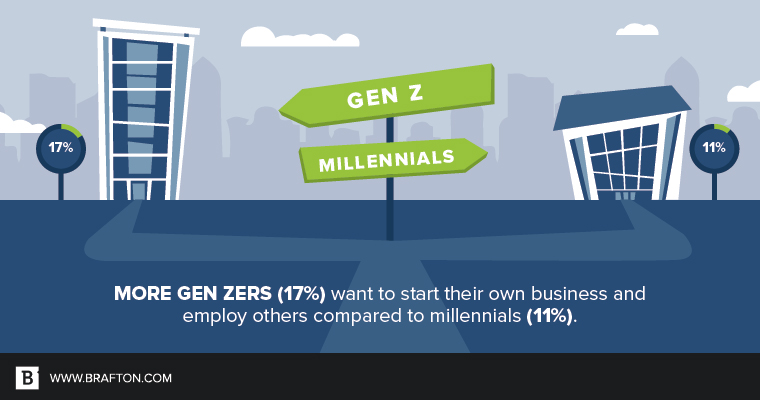Move along, millennials – it’s now all about Gen Z.
Fleeting are the days millennials are seen as the provocative “thought leaders” and wanderlusting, globe-trotting “brand consultants” they think they are. There’s a newer, younger generation in town, and they’re on track to out-best even the most ego-centric of millennials.
Meet Generation Z (also known as iGeneration), our youngest, most-connected, educated and sophisticated generation ever.
Gen Zers are the 75+ million kids and young adults who were born between 1996 and 2010, and they’re on track to account for 40 percent of all consumers by 2020. With Gen Zers being as young as they are, we already know that most are likely still living with their parents and are influencing their parents’ buying behaviors bigly. Beyond that, Gen Zers are presenting themselves as the latest wave of entrepreneurs shaping the future of business as we know it.

Digital natives
Being born with smartphone in hand, Gen Zers are the first generation to never know life without smartphones or social media. This means they are the most technologically savvy generation ever.
They are hyperware, easily distracted and able to recognize ads immediately.
Many in the iGeneration consider ads to be interruptions to viewing their intended video or piece of content. It is no surprise then, that 69 percent of Gen Zers avoid ads through ad blockers. As ad-blocking technology continues to become more sophisticated, undoubtedly Gen Zers will make greater use of them. This of course will have a large impact on how marketers reach this generation.
Gen Z characteristics
Gen Zers are a throwback to their great-grandparents and the “Silent” generation.
Growing up in an uncertain world and watching from afar as the millennials make mistakes, the post-millennial generation comprises a more cautious class that tends to steer away from risky behaviors and pursue more sensible careers and choices. This is apparent with their desire for privacy and their widespread usage of anonymous social apps like Whisper and Snapchat, where the likelihood of something, like an unsavory, non-future-employer-facing Facebook status from the internet, coming back to haunt them is less probable.
Having the mistakes of their predecessors to remind them of what not to do, those in the iGeneration are combining the best qualities and characteristics of all generations and bringing them together to create a more cohesive team environment in the business world.
How to appeal to this new generation
Beyond technology, Gen Zers also differentiate themselves from millennials in that they are more culturally and ethnically diverse, and they want to make a positive difference in the world.
It would be wise for marketers and employers alike to increase efforts to build identities and cultures of giving back, which helps give consumers and employees a sense of purpose. Social responsibility is important to this new generation, and they will seek opportunities to volunteer, give back and tie their buying behaviors to a positive social impact; their viewpoints will most definitely have a profound impact across generations and cultures for years to come.
Marketers and brands will need to learn how to see the world through the diverse and socially responsible eyes of Gen Zers if they have any chance of winning their loyalty.
Entrepreneurial spirit
In the same vein, these young people strive to be pioneers, not merely settlers in their careers or endeavors. They want to be taken seriously, and they recognize that their success should derive from their ideas and contributions – not just from age or seniority.
With their ubiquitous access to real-time information, this generation has more people and resources at their fingertips than any other. They’re also young, which means that if they fail, they can easily get back on the horse to try again. The world is their oyster, and they have their whole lives ahead of them. Growing up jaded with a tough economy, terrorism and other life complexities, post-millennials also realize that life is hard and requires work.
This generation is willing to work hard to attain success, and if they work for an employer, the relationship requires trust. As employers, Gen Zers will strive to establish a culture of honesty and trust with their own employees where ideas can be openly shared and fostered.
This also applies to the brands the iGeneration purchases from. To earn their dollars, brands must earn their trust.
In conclusion
The rise of Gen Z certainly isn’t the only major generational change that needs to be anticipated by marketers and employers. However, they represent a massive group which will no doubt be critical in shaping the future of business and marketing.
The more we can prepare ourselves for this next wave of leaders and entrepreneurs, the more likely it’ll be that we’ll be ready to harness their potential and all the opportunities that come with them.




